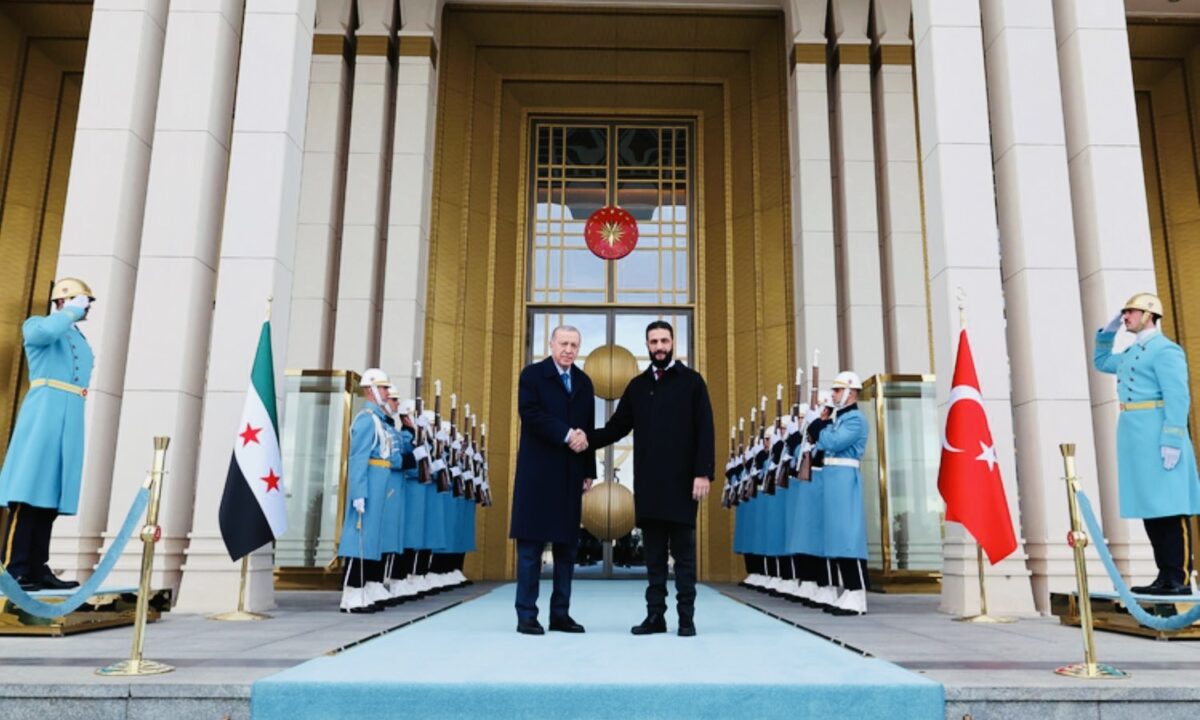The swift collapse of Syrian President Bashar al-Assad’s secular regime, followed by the rapid emergence of an Islamist government in Damascus, are driving speculation that Israel and Turkey could be on the cusp of a collision course in Syria.
Early last month, an Israeli government committee headed by Jacob Nagel, a former high-ranking Israeli army officer, released a report warning that Turkey’s ambition to supplant Iran or Russia as the leading foreign power in post-Assad Syria could present security challenges to Israel in the future.
Nagel warned that Turkey, a supporter of Hayat Tahrir al-Sham, the Syrian Islamist rebel outfit that toppled Assad in December, may well work with Syrian proxy forces hostile to Israel.

Nagel’s report takes on greater significance in light of Turkish press reports that Turkey is keen to extend its growing influence in Syria by rebuilding the Syrian army, establishing military bases, and expanding its diplomatic footprint.
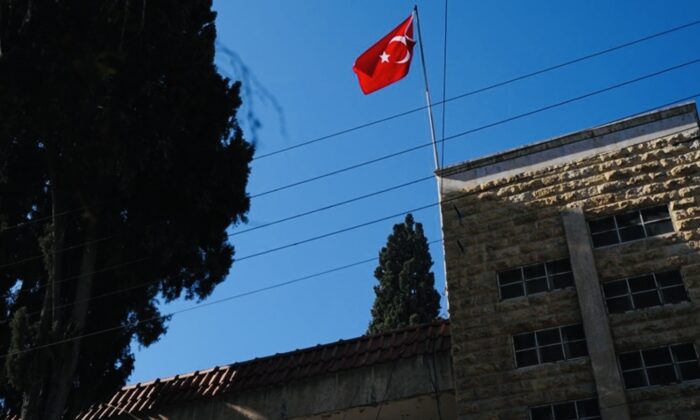
On February 4, Ahmed al-Shara, Syria’s interim president, visited Turkey to discuss these and other issues. On the eve of his trip, the Reuters news agency reported that Shara and Turkish President Recep Tayyip Erdogan were expected to explore the possibility of a joint defence pact and the establishment of Turkish air bases in central Syria.
According to The New York Times, Shara told Erdogan that he sought a “deep, strategic relationship in all fields” with Turkey. Syria shares a long border with Turkey, which hosts more than three million Syrian refugees who fled during Syria’s civil war from 2011 until 2024.
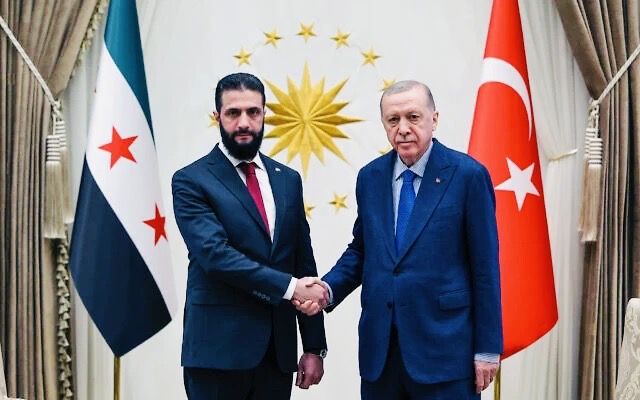
Nagel, in his report, mentioned Erdogan’s desire to replicate Turkey’s Ottoman past. Speaking at a conference of his Justice and Development Party recently, Erdogan alluded to his desire to restore the Ottoman empire’s caliphate through Turkey’s strategic control of Syria. In a reference to the colonial division of the Middle East following World War I, he said, “If the region had not been divided, (Syrian) cities like Aleppo, Sham (Damascus), Hama and Homs would still be part of Turkey.”
Given Erdogan’s neo-Ottoman fixation, his recent demand for an Israeli withdrawal from Syria came as no surprise.
“The aggressive actions of the forces attacking Syrian territory, Israel in particular, must come to an end as soon as possible,” he said on January 15. He added menacingly that Israel’s failure to pull out of Syrian lands would cause “unfavorable outcomes for everyone.”
Erdogan’s call for an Israeli withdrawal is hypocritical, since Turkey has forcibly created an extra-territorial buffer zone in northern Syria along its southern border to keep Kurdish “terrorists” at bay.
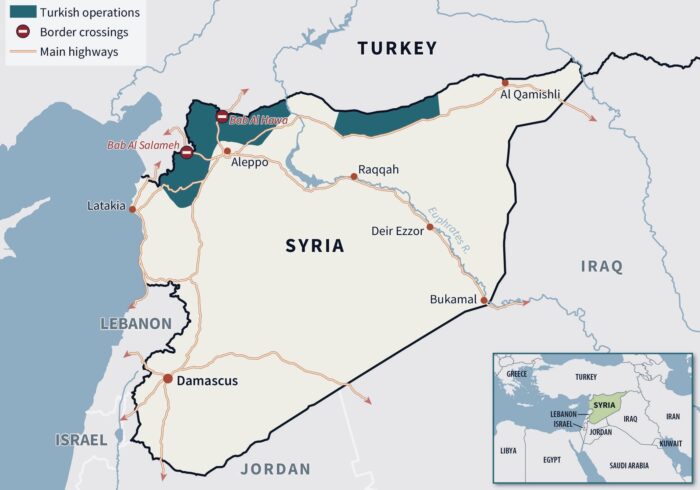
As expected, Israel’s Foreign Ministry “completely” rejected Erdogan’s demand: “The aggressive imperialist actor in Syria (as well as in northern Cyprus, Libya and other areas in the Middle East) is Turkey. It is advisable for the Turkish president to avoid unnecessary threats. The State of Israel will continue to act to protect its borders from any threat.”
Shortly after Assad’s fall, Israel unilaterally occupied the Syrian side of Mount Hermon and the United Nations demilitarized zone near the Golan Heights, saying these were temporary and defensive measures required for its security at a moment of uncertainty in Syria.

Since then, Shara has repeatedly demanded Israel’s pullout from Syrian territory.
Israel also bombed stockpiles of Syrian strategic weapons so that they would not fall into the hands of diehard Assad loyalists or Islamic State, which maintains pockets of resistance in Syria.
On February 8, the Israeli Air Force struck a Hamas weapons depot near the Syrian town of Deir Ali, south of Damascus.These arms were allocated for attacks against Israeli troops, the Israel Defence Forces said in a communique.
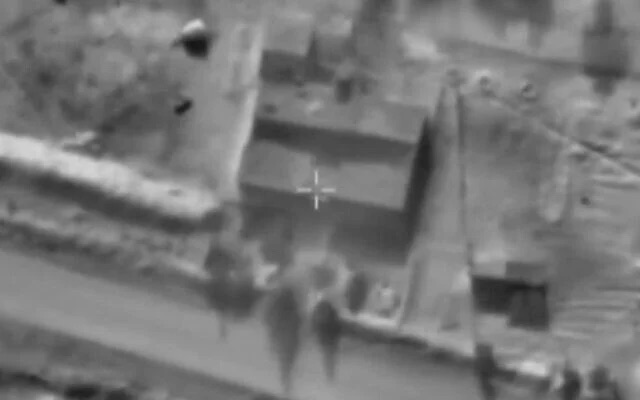
Israel’s unilateral moves in Syria have been in keeping with its historically rocky relations with successive Syrian regimes. Since its birth, Israel has been locked in a state of war with Syria, having fought four wars and numerous skirmishes with the Syrians since 1948.
During the Assad era, Syria permitted Iran, Israel’s deadliest enemy, to set up military bases on Syrian soil. In addition, Assad allowed Hezbollah — the Lebanese militia which fought a war with Israel in southern Lebanon recently — to transfer Iranian arms to Lebanon through Syria.
The current tension between Israel and Turkey over Syria is the latest chapter in a mercurial relationship influenced by Israel’s bitter conflict with the Palestinians.
Turkey, the sole Muslim member state of the NATO alliance, was the first Muslim state to recognize Israel. Yet Turkey’s bilateral relations with Israel were generally fraught due to its unflagging commitment to the Palestinian cause.
Israel’s first cross-border war with Hamas in 2008 drew harsh condemnation in Turkey, an avid supporter of Hamas.Turkey rejects Hamas’ designation in the West as a terrorist organization. Turkey has provided shelter to Hamas operatives and has even granted them citizenship. As well, the Turkish government allows Hamas to raise funds in Turkey and grants Hamas access to its financial and banking systems.
The Turkish media is staunchly pro-Palestinian. And “Zionism” is a “dirty word” in Turkey, as I discovered on a press trip to Istanbul and Ankara some years ago.
The Mavi Marmara incident in 2010, during which Israeli commandos killed nine Turks aboard a Turkish vessel attempting to break Israel’s naval siege of Gaza, soured Turkey’s ties with Israel. Turkey recalled its ambassador in Tel Aviv and ordered Israel’s envoy in Ankara to leave.
After a lengthy chill, Israel and Turkey returned to the status quo ante. But in 2018, following tensions along Israel’s border with Gaza resulting in the deaths of scores of Palestinian protesters, Turkey withdrew its ambassador in Israel yet again in a tangible sign of displeasure.
In 2022, Turkey pragmatically restored normal relations with Israel. A year later, in the wake of the Hamas terrorist attack on October 7 that claimed the lives of roughly 1,200 Israelis and foreigners, tensions flared once more.
Much to Israel’s pique and disappointment, Turkey did not condemn Hamas’ massacre. Instead, Erdogan lashed out at Israel’s military campaign in Gaza, recalled Turkey’s ambassador in Tel Aviv, severed trade ties with Israel, accused Israel of genocidal practices, and joined South Africa’s genocide case against Israel at the International Court of Justice.

Since October 7, Erdogan has described Israel as a security threat, falsely claiming that it covets Turkish territory. Addressing the Turkish parliament only a day after Hamas’ attack, Erdogan said, “What we are facing is not a state, but a bloodthirty gang of murderers.”
Writing in the pro-government Turkish newspaper Daily Sabah on October 11, 2024, the commentator Murat Yesiltas surmised that Erdogan’s portrayal of Israel as a national security threat “signals a serious change in Turkish-Israeli relations.”
“In particular, Israel’s aggressive policies in Gaza and Lebanon and its moves to change the regional status quo raise major security concerns for Turkey,” he added.
According to Yesiltas, Erdogan is upset that Israel is eliminating the possibility of a two-state solution and supposedly drawing Iran into a war. Erdogan apparently believes that Israel is profoundly affecting the balance of power in the Middle East in its favor.
Erdogan’s beliefs are a guarantor that Turkey’s bilateral relations with Israel will remain on knife’s edge as long as the Palestinian problem lingers and he and his party dominate Turkish politics.
And now that Israel and Turkey are at odds in Syria, the situation is likely to deteriorate, further straining a relationship that has grown increasingly tense and problematic.
